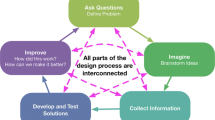Abstract
Several biases and thresholds challenge the reach of girls in technology-related activities. For this contribution we collected and structured existing research and good practices on how to reach girls within projects in the field educational robotics, makerspaces, coding and STEM in general. The contribution presents general guidelines for future activities with a potential higher rate of participating girls in makerspace settings.
Access this chapter
Tax calculation will be finalised at checkout
Purchases are for personal use only
Similar content being viewed by others
References
Legewie, J., DiPrete, T.A.: The high school environment and the gender gap in science and engineering. Sociol. Educ. 87(4), 259–280 (2014)
Wittemyer, R., et al.: MakeHers: engaging girls and women in technology through making, creating, and inventing. Study by Intel Corporation (2014)
Cussó-Calabuig, R., Carrera Farran, X., Bosch-Capblanch, X.: Are boys and girls still digitally differentiated? The case of Catalonian teenagers. J. Inf. Technol. Educ. Res. 16, 411–435 (2017)
Sullivan, A., Bers, M.U.: Girls, boys, and bots: gender differences in young children’s performance on robotics and programming tasks. J. Inf. Technol. Educ. Innov. Pract. 15, 145–165 (2016). http://www.informingscience.org/Publications/3547. Accessed 15 July 2018
UNESCO: STEM and gender advancement (SAGA) (project homepage). https://en.unesco.org/saga. Accessed 14 July 2018
Schön, S., Jagrikova, R., Voigt, C.: Social innovations within makerspace settings for early entrepreneurial education - the DOIT project. In: Proceedings of the EdMedia Conference, Amsterdam, 25–29 June 2018, pp. 1716–1725. (2018). http://www.learntechlib.org/primary/j/EDMEDIA/v/2018/n/1/. Accessed 15 July 2018
Hyun, T.: Middle school girls: perceptions and experiences with robotics. ProQuest LLC, Ed.D. dissertation, California State University, Fullerton (2014). https://search.proquest.com/docview/1553689179. Accessed 15 July 2018
Macdonald, A.: Gender action guidelines. Inventory of considerations that must be taken into account during the development of a workshop for Fab Labs. Phalabs 4.0 - PHotonics enhanced fAB LABS supporting the next revolution in digitalization (2018). http://www.phablabs.eu/. Accessed 15 July 2018
Tan, E., Calabrese Barton, A., Kang, H., O’Neill, T.: Desiring a career in STEM-related fields: how middle school girls articulate and negotiate identities-in-practice in science. J. Res. Sci. Teach. 50(10), 1143–1179 (2013)
Kekelis, L., Ryoo, J., McLeod, E.: Making and mentors: what it takes to make them better together. Afterschool Matters 26, 8–17 (2017)
Schön, S., Ebner, M., Reip, I.: Kreative digitale Arbeit mit Kindern in einer viertägigen offenen Werkstatt. Medienimpulse, no. 1 (2016). https://www.medienimpulse.at/articles/view/829. Accessed 15 July 2018
Gappmaier, L.: MakerDays for kids – analyse und Konzepterstellung. In: Ebner, M., Schön, S. (eds.) iTUG, vol. 8. Book On Demand. Norderstedt (2018). https://itug.eu. Accessed 23 July 2018
Kuhar, R., Zobec, A.: The anti-gender movement in Europe and the educational process in public schools. CEPS J. 7(2), 29–46 (2017)
Gomoll, A., Hmelo-Silver, C., Šabanović, S., Francisco, M.: Dragons, ladybugs, and softballs: girls’ STEM engagement with human-centered robotics. J. Sci. Educ. Technol. 25(6), 899–914 (2016)
Schön, S., Ebner, M., Kumar, S.: The maker movement. Implications of new digital gadgets, fabrication tools and spaces for creative learning and teaching. In: eLearning Papers, vol. 39, pp. 14–25 (2014)
Author information
Authors and Affiliations
Corresponding author
Editor information
Editors and Affiliations
Rights and permissions
Copyright information
© 2020 Springer Nature Switzerland AG
About this paper
Cite this paper
Schön, S., Rosenova, M., Ebner, M., Grandl, M. (2020). How to Support Girls’ Participation at Projects in Makerspace Settings. Overview on Current Recommendations. In: Moro, M., Alimisis, D., Iocchi, L. (eds) Educational Robotics in the Context of the Maker Movement. Edurobotics 2018. Advances in Intelligent Systems and Computing, vol 946. Springer, Cham. https://doi.org/10.1007/978-3-030-18141-3_15
Download citation
DOI: https://doi.org/10.1007/978-3-030-18141-3_15
Published:
Publisher Name: Springer, Cham
Print ISBN: 978-3-030-18140-6
Online ISBN: 978-3-030-18141-3
eBook Packages: Intelligent Technologies and RoboticsIntelligent Technologies and Robotics (R0)




